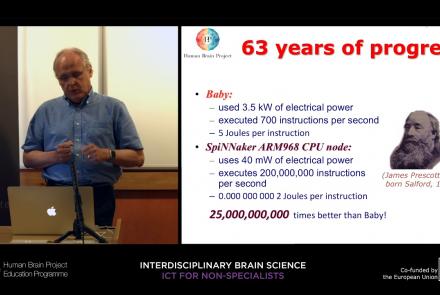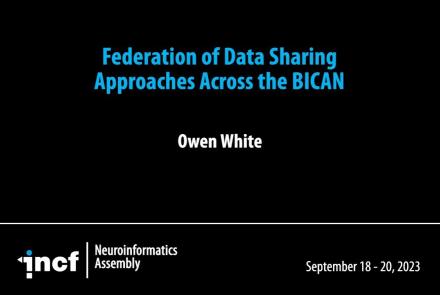Course:
This lesson provides an introduction to biologically detailed computational modelling of neural dynamics, including neuron membrane potential simulation and F-I curves.
Difficulty level: Intermediate
Duration: 8:21
Speaker: : Mike X. Cohen
Course:
In this lesson, users learn how to use MATLAB to build an adaptive exponential integrate and fire (AdEx) neuron model.
Difficulty level: Intermediate
Duration: 22:01
Speaker: : Mike X. Cohen
Course:
In this lesson, users learn about the practical differences between MATLAB scripts and functions, as well as how to embed their neuronal simulation into a callable function.
Difficulty level: Intermediate
Duration: 11:20
Speaker: : Mike X. Cohen
Course:
This lesson teaches users how to generate a frequency-current (F-I) curve, which describes the function that relates the net synaptic current (I) flowing into a neuron to its firing rate (F).
Difficulty level: Intermediate
Duration: 20:39
Speaker: : Mike X. Cohen
This lecture covers visualizing extracellular neurotransmitter dynamics
Difficulty level: Beginner
Duration: 23:20
Speaker: : Christian Henneberger
This lecture provides an introduction to the study of eye-tracking in humans.
Difficulty level: Beginner
Duration: 34:05
Speaker: : Ulrich Ettinger
This lecture discusses the the importance and need for data sharing in clinical neuroscience.
Difficulty level: Intermediate
Duration: 25:22
Speaker: : Thomas Berger
This lecture gives insights into the Medical Informatics Platform's current and future data privacy model.
Difficulty level: Intermediate
Duration: 17:29
Speaker: : Yannis Ioannidis
This lecture gives an overview on the European Health Dataspace.
Difficulty level: Intermediate
Duration: 26:33
Speaker: : Licino Kustra Mano
This lesson continues with the second workshop on reproducible science, focusing on additional open source tools for researchers and data scientists, such as the R programming language for data science, as well as associated tools like RStudio and R Markdown. Additionally, users are introduced to Python and iPython notebooks, Google Colab, and are given hands-on tutorials on how to create a Binder environment, as well as various containers in Docker and Singularity.
Difficulty level: Beginner
Duration: 1:16:04
Speaker: : Erin Dickie and Sejal Patel
In this lesson, you will learn about hardware for computing for non-ICT specialists.
Difficulty level: Beginner
Duration: 43:21
Speaker: : Steve Furber
Course:
This lesson describes the principles underlying functional magnetic resonance imaging (fMRI), diffusion-weighted imaging (DWI), tractography, and parcellation. These tools and concepts are explained in a broader context of neural connectivity and mental health.
Difficulty level: Intermediate
Duration: 1:47:22
Speaker: : Erin Dickie and John Griffiths
Course:
This tutorial introduces pipelines and methods to compute brain connectomes from fMRI data. With corresponding code and repositories, participants can follow along and learn how to programmatically preprocess, curate, and analyze functional and structural brain data to produce connectivity matrices.
Difficulty level: Intermediate
Duration: 1:39:04
Speaker: : Erin Dickie and John Griffiths
This is a tutorial on designing a Bayesian inference model to map belief trajectories, with emphasis on gaining familiarity with Hierarchical Gaussian Filters (HGFs).
This lesson corresponds to slides 65-90 of the PDF below.
Difficulty level: Intermediate
Duration: 1:15:04
Speaker: : Daniel Hauke
This lesson gives a description of the BrainHealth Databank, a repository of many types of health-related data, whose aim is to accelerate research, improve care, and to help better understand and diagnose mental illness, as well as develop new treatments and prevention strategies.
This lesson corresponds to slides 46-78 of the PDF below.
Difficulty level: Beginner
Duration: 1:12:25
Speaker: : Joanna Yu
This lecture covers different perspectives on the study of the mental, focusing on the difference between Mind and Brain.
Difficulty level: Beginner
Duration: 1:16:30
Speaker: : Paul F.M.J. Verschure
This lecture covers a lot of post-war developments in the science of the mind, focusing first on the cognitive revolution, and concluding with living machines.
Difficulty level: Beginner
Duration: 2:24:35
Speaker: : Paul F.M.J. Verschure
This talk goes over Neurobagel, an open-source platform developed for improved dataset sharing and searching.
Difficulty level: Beginner
Duration: 13:37
Speaker: : Jean-Babtiste Poline
In this lesson, you will learn about the BRAIN Initiative Cell Atlas Network (BICAN) and how this project adopts a federated approach to data sharing.
Difficulty level: Beginner
Duration: 11:23
Speaker: : Owen White
This brief talk goes into work being done at The Alan Turing Institute to solve real-world challenges and democratize computer vision methods to support interdisciplinary and international researchers.
Difficulty level: Beginner
Duration: 7:10
Speaker: : Alden Connor & Beatriz Costa Gomes
Topics
- Artificial Intelligence (7)
- Philosophy of Science (5)
- Provenance (3)
- protein-protein interactions (1)
- Extracellular signaling (1)
- Animal models (8)
- Assembly 2021 (29)
- Brain-hardware interfaces (14)
- Clinical neuroscience (40)
- International Brain Initiative (2)
- Repositories and science gateways (11)
- Resources (6)
- General neuroscience
(62)
- Neuroscience (11)
- Cognitive Science (7)
- (-) Cell signaling (6)
- Brain networks (11)
- Glia (1)
- Electrophysiology (41)
- Learning and memory (5)
- Neuroanatomy (24)
- Neurobiology (16)
- (-) Neurodegeneration (1)
- Neuroimmunology (1)
- Neural networks (15)
- Neurophysiology (27)
- (-) Neuropharmacology (2)
- Neuronal plasticity (16)
- (-) Synaptic plasticity (4)
- (-) Visual system (12)
- Phenome (1)
- General neuroinformatics
(27)
- (-) Computational neuroscience (276)
- Statistics (7)
- (-) Computer Science (21)
- Genomics (32)
- (-)
Data science
(34)
- Open science (57)
- Project management (8)
- Education (4)
- Publishing (4)
- Neuroethics (40)




















